formerly eScholarship Editions


|
|
|
|
Your request for similar items found 20 book(s). | Modify Search | Displaying 1 - 20 of 20 book(s) | |
| 1. | 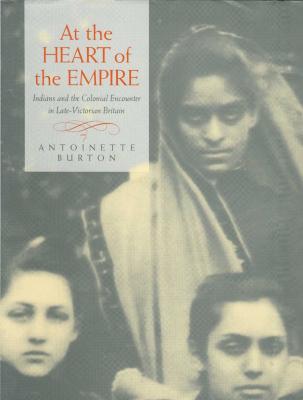 | Title: At the heart of the Empire: Indians and the colonial encounter in late-Victorian Britain Author: Burton, Antoinette M 1961- Published: University of California Press, 1998 Subjects: History | Women's Studies | Autobiographies and Biographies | South Asia | Victorian History | Travel | European History | Asian History Publisher's Description: Antoinette Burton focuses on the experiences of three Victorian travelers in Britain to illustrate how "Englishness" was made and remade in relation to imperialism. The accounts left by these three sojourners - all prominent, educated Indians - represent complex, critical ethnographies of "native" metropolitan society and offer revealing glimpses of what it was like to be a colonial subject in fin-de-siècle Britain. Burton's innovative interpretation of the travelers' testimonies shatters the myth of Britain's insularity from its own construction of empire and shows that it was instead a terrain open to continual contest and refiguration.Burton's three subjects felt the influence of imperial power keenly during even the most everyday encounters in Britain. Pandita Ramabai arrived in London in 1883 seeking a medical education and left in 1886, having resisted the Anglican Church's attempts to make her an evangelical missionary. Cornelia Sorabji went to Oxford to study law and became the first Indian woman to be called to the Bar. Behramji Malabari sought help for his Indian reform projects in England, and subjected London to colonial scrutiny in the process. Their experiences form the basis of this wide-ranging, clearly written, and imaginative investigation of diasporic movement in the colonial metropolis. [brief] Similar Items |
| 2. | 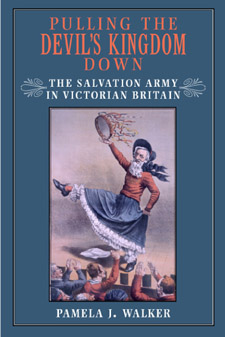 | Title: Pulling the devil's kingdom down: the Salvation Army in Victorian Britain Author: Walker, Pamela J 1960- Published: University of California Press, 2001 Subjects: History | Christianity | Victorian History | Religion | Women's Studies Publisher's Description: Those people in uniforms who ring bells and raise money for the poor during the holiday season belong to a religious movement that in 1865 combined early feminism, street preaching, holiness theology, and intentionally outrageous singing into what soon became the Salvation Army. In Pulling the Devil's Kingdom Down, Pamela Walker emphasizes how thoroughly the Army entered into nineteenth-century urban life. She follows the movement from its Methodist roots and East London origins through its struggles with the established denominations of England, problems with the law and the media, and public manifestations that included street brawls with working-class toughs. The Salvation Army was a neighborhood religion, with a "battle plan" especially suited to urban working-class geography and cultural life. The ability to use popular leisure activities as inspiration was a major factor in the Army's success, since pubs, music halls, sports, and betting were regarded as its principal rivals. Salvationist women claimed the "right to preach" and enjoyed spiritual authority and public visibility more extensively than in virtually any other religious or secular organization. Opposition to the new movement was equally energetic and took many forms, but even as contemporary music hall performers ridiculed the "Hallelujah Lasses," the Salvation Army was spreading across Great Britain and the Continent, and on to North America. The Army offered a distinctive response to the dilemmas facing Victorian Christians, in particular the relationship between what Salvationists believed and the work they did. Walker fills in the social, cultural, and religious contexts that make that relationship come to life. [brief] Similar Items |
| 3. | 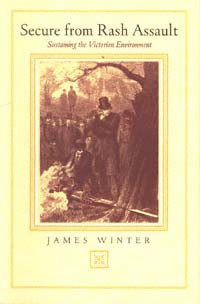 | Title: Secure from rash assault: sustaining the Victorian environment Author: Winter, James H 1925- Published: University of California Press, 1999 Subjects: History | Victorian History | Ecology | Geography | Technology and Society Publisher's Description: Nineteenth-century Britain led the world in technological innovation and urbanization, and unprecedented population growth contributed as well to the "rash assault," to quote Wordsworth, on Victorian countrysides. Yet James Winter finds that the British environment was generally spared widespread ecological damage.Drawing from a remarkable variety of sources and disciplines, Winter focuses on human intervention as it not only destroyed but also preserved the physical environment. Industrial blight could be contained, he says, because of Britain's capacity to import resources from elsewhere, the conservative effect of the estate system, and certain intrinsic limitations of steam engines. The rash assault was further blunted by traditional agricultural practices, preservation of forests, and a growing recreation industry that favored beloved landscapes. Winter's illumination of Victorian attitudes toward the exploitation of natural resources offers a valuable preamble to ongoing discussions of human intervention in the environment. [brief] Similar Items |
| 4. | 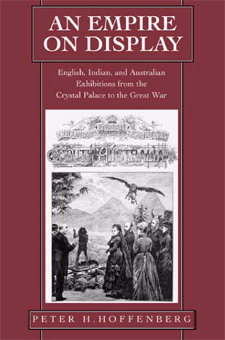 | Title: An empire on display: English, Indian, and Australian exhibitions from the Crystal Palace to the Great War Author: Hoffenberg, Peter H 1960- Published: University of California Press, 2001 Subjects: History | European History | Victorian History | Asian History | South Asia | Pacific Rim Studies | European Studies Publisher's Description: The grand exhibitions of the Victorian and Edwardian eras are the lens through which Peter Hoffenberg examines the economic, cultural, and social forces that helped define Britain and the British Empire. He focuses on major exhibitions in England, Australia, and India between the Great Exhibition of 1851 and the Festival of Empire sixty years later, taking special interest in the interactive nature of the exhibition experience, the long-term consequences for the participants and host societies, and the ways in which such popular gatherings revealed dissent as well as celebration. Hoffenberg shows how exhibitions shaped culture and society within and across borders in the transnational working of the British Empire. The exhibitions were central to establishing and developing a participatory imperial world, and each polity in that world provided distinctive information, visitors, and exhibits. Among the displays were commercial goods, working machines, and ethnographic scenes. Exhibits were intended to promote external commonwealth and internal nationalism. The imperial overlay did not erase significant differences but explained and used them in economic and cultural terms. The exhibitions in cities such as London, Sydney, and Calcutta were living and active public inventories of the Empire and its national political communities. The process of building and consuming such inventories persists today in the cultural bureaucracies, museums, and festivals of modern nation-states, the appeal to tradition and social order, and the actions of transnational bodies. [brief] Similar Items |
| 5. | 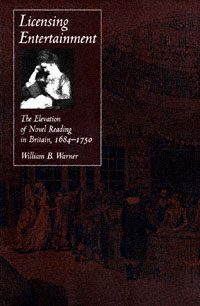 | Title: Licensing entertainment: the elevation of novel reading in Britain, 1684-1750 Author: Warner, William Beatty Published: University of California Press, 1998 Subjects: Literature | European History | Print Media | English Literature Publisher's Description: Novels have been a respectable component of culture for so long that it is difficult for twentieth-century observers to grasp the unease produced by novel reading in the eighteenth century. William Warner shows how the earliest novels in Britain, published in small-format print media, provoked early instances of the modern anxiety about the effects of new media on consumers.Warner uncovers a buried and neglected history of the way in which the idea of the novel was shaped in response to a newly vigorous market in popular narratives. In order to rein in the sexy and egotistical novel of amorous intrigue, novelists and critics redefined the novel as morally respectable, largely masculine in authorship, national in character, realistic in its claims, and finally, literary. Warner considers early novelists in their role as entertainers and media workers, and shows how the short, erotic, plot-driven novels written by Behn, Manley, and Haywood came to be absorbed and overwritten by the popular novels of Defoe, Richardson, and Fielding. Considering these novels as entertainment as well as literature, Warner traces a different story - one that redefines the terms within which the British novel is to be understood and replaces the literary history of the rise of the novel with a more inclusive cultural history. [brief] Similar Items |
| 6. | 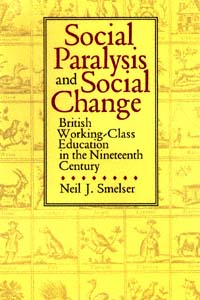 | Title: Social paralysis and social change: British working-class education in the nineteenth century Author: Smelser, Neil J Published: University of California Press, 1991 Subjects: History | History | European History | Education Publisher's Description: Neil Smelser's Social Paralysis and Social Change is one of the most comprehensive histories of mass education ever written. It tells the story of how working-class education in nineteenth-century Britain - often paralyzed by class, religious, and economic conflict - struggled forward toward change.This book is ambitious in scope. It is both a detailed history of educational development and a theoretical study of social change, at once a case study of Britain and a comparative study of variations within Britain. Smelser simultaneously meets the scholarly standards of historians and critically addresses accepted theories of educational change - "progress," conflict, and functional theories. He also sheds new light on the process of secularization, the relations between industrialization and education, structural differentiation, and the role of the state in social change.This work marks a return for the author to the same historical arena - Victorian Britain - that inspired his classic work Social Change in the Industrial Revolution thirty-five years ago. Smelser's research has again been exhaustive. He has achieved a remarkable synthesis of the huge body of available materials, both primary and secondary.Smelser's latest book will be most controversial in its treatment of class as a primordial social grouping, beyond its economic significance. Indeed, his demonstration that class, ethnic, and religious groupings were decisive in determining the course of British working-class education has broad-ranging implications. These groupings remain at the heart of educational conflict, debate, and change in most societies - including our own - and prompt us to pose again and again the chronic question: who controls the educational terrain? [brief] Similar Items |
| 7. | 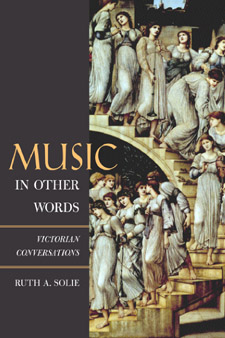 | Title: Music in other words: Victorian conversations Ruth A. Solie Author: Solie, Ruth A Published: University of California Press, 2004 Subjects: Music | Classical Music | Musicology | Women's Studies | Victorian History Publisher's Description: Just as the preoccupations of any given cultural moment make their way into the language of music, the experience of music makes its way into other arenas of life. To unearth these overlapping meanings and vocabularies from the Victorian era, Ruth A. Solie examines sources as disparate as journalism, novels, etiquette manuals, religious tracts, and teenagers' diaries for the muffled, even subterranean, conversations that reveal so much about what music meant to the Victorians. Her essays, giving voice to "what goes without saying" on the subject - that cultural information so present and pervasive as to go unsaid - fill in some of the most intriguing blanks in our understanding of music's history. This much-anticipated collection, bringing together new and hard-to-find pieces by an acclaimed musicologist, mines the abundant casual texts of the period to show how Victorian-era people - English and others - experienced music and what they understood to be its power and its purposes. Solie's essays start from topics as varied as Beethoven criticism, Macmillan's Magazine, George Eliot's Daniel Deronda, opera tropes in literature, and the Victorian myth of the girl at the piano. They evoke common themes - including the moral force that was attached to music in the public mind and the strongly gendered nature of musical practice and sensibility - and in turn suggest the complex links between the history of music and the history of ideas. [brief] Similar Items |
| 8. | 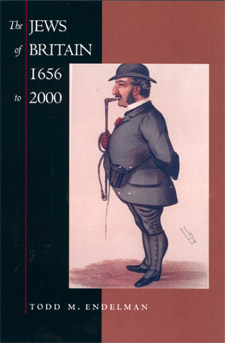 | Title: The Jews of Britain, 1656 to 2000 Author: Endelman, Todd M Published: University of California Press, 2002 Subjects: Jewish Studies | European History | Ethnic Studies | Immigration Publisher's Description: In Todd Endelman's spare and elegant narrative, the history of British Jewry in the modern period is characterized by a curious mixture of prominence and inconspicuousness. British Jews have been central to the unfolding of key political events of the modern period, especially the establishment of the State of Israel, but inconspicuous in shaping the character and outlook of modern Jewry. Their story, less dramatic perhaps than that of other Jewish communities, is no less deserving of this comprehensive and finely balanced analytical account. Even though Jews were never completely absent from Britain after the expulsion of 1290, it was not until the mid- seventeenth century that a permanent community took root. Endelman devotes chapters to the resettlement; to the integration and acculturation that took place, more intensively than in other European states, during the eighteenth century; to the remarkable economic transformation of Anglo-Jewry between 1800 and 1870; to the tide of immigration from Eastern Europe between 1870 and 1914 and the emergence of unprecedented hostility to Jews; to the effects of World War I and the turbulent events up to and including the Holocaust; and to the contradictory currents propelling Jewish life in Britain from 1948 to the end of the twentieth century. We discover not only the many ways in which the Anglo-Jewish experience was unique but also what it had in common with those of other Western Jewish communities. [brief] Similar Items |
| 9. | 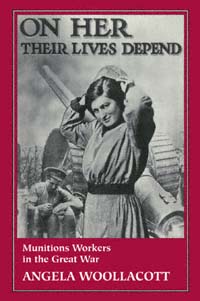 | Title: On her their lives depend: munitions workers in the Great War Author: Woollacott, Angela 1955- Published: University of California Press, 1994 Subjects: History | European History | Women's Studies Publisher's Description: In this evocative book, Angela Woollacott analyzes oral histories, workers' writings, newspapers, official reports, and factory song lyrics to present an intimate view of women munitions workers in Britain during World War I.Munitions work offered working-class women - for the first time - independence, a reliable income, even an improved standard of living. But male employers and trade unionists brought them face-to-face with their subordination as women within their own class, while experiences with middle-class women co-workers and police reminded them of their status as working class.Woollacott sees the woman munitions worker as a powerful symbol of modernity who challenged the gender order through her patriotic work and challenged class differences through her increased spending power, mobility, and changing social behavior. [brief] Similar Items |
| 10. | 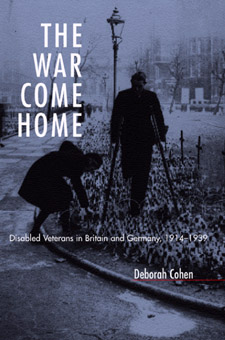 | Title: The war come home: disabled veterans in Britain and Germany, 1914-1939 Author: Cohen, Deborah 1968- Published: University of California Press, 2001 Subjects: History | European History | German Studies | Military History | European Studies Publisher's Description: Disabled veterans were the First World War's most conspicuous legacy. Nearly eight million men in Europe returned from the First World War permanently disabled by injury or disease. In The War Come Home, Deborah Cohen offers a comparative analysis of the very different ways in which two belligerent nations--Germany and Britain--cared for their disabled. At the heart of this book is an apparent paradox. Although postwar Germany provided its disabled veterans with generous benefits, they came to despise the state that favored them. Disabled men proved susceptible to the Nazi cause. By contrast, British ex-servicemen remained loyal subjects, though they received only meager material compensation. Cohen explores the meaning of this paradox by focusing on the interplay between state agencies and private philanthropies on one hand, and the evolving relationship between disabled men and the general public on the other. Written with verve and compassion, The War Come Home describes in affecting detail disabled veterans' lives and their treatment at the hands of government agencies and private charities in Britain and Germany. Cohen's study moves from the intimate confines of veterans' homes to the offices of high-level bureaucrats; she tells of veterans' protests, of disabled men's families, and of the well-heeled philanthropists who made a cause of the war's victims. This superbly researched book provides an important new perspective on the ways in which states and societies confront the consequences of industrialized warfare. [brief] Similar Items |
| 11. | 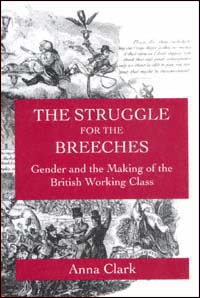 | Title: The struggle for the breeches: gender and the making of the British working class Author: Clark, Anna Published: University of California Press, 1997 Subjects: History | European History | Gender Studies | Labor Studies Publisher's Description: Linking the personal and the political, Anna Clark depicts the making of the working class in Britain as a "struggle for the breeches." The late eighteenth and early nineteenth centuries witnessed significant changes in notions of masculinity and femininity, the sexual division of labor, and sexual mores, changes that were intimately intertwined with class politics. By integrating gender into the analysis of class formation, Clark transforms the traditional narrative of working-class history.Going beyond the sterile debate about whether economics or language determines class consciousness, Clark integrates working people's experience with an analysis of radical rhetoric. Focusing on Lancashire, Glasgow, and London, she contrasts the experience of artisans and textile workers, demonstrating how each created distinctively gendered communities and political strategies.Workers faced a "sexual crisis," Clark claims, as men and women competed for jobs and struggled over love and power in the family. While some radicals espoused respectability, others might be homophobes, wife-beaters, and tyrants at home; a radical's love of liberty could be coupled with lust for the life of a libertine. Clark shows that in trying to create a working class these radicals closed off the movement to women, instead adopting a conservative rhetoric of domesticity and narrowing their notion of the working class. [brief] Similar Items |
| 12. | 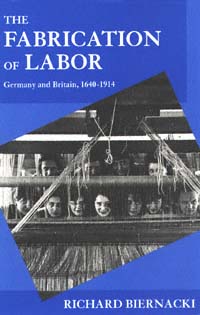 | Title: The fabrication of labor: Germany and Britain, 1640-1914 Author: Biernacki, Richard 1956- Published: University of California Press, 1997 Subjects: History | Sociology | Labor Studies | European History Publisher's Description: This monumental study demonstrates the power of culture to define the meaning of labor. Drawing on massive archival evidence from Britain and Germany, as well as historical evidence from France and Italy, The Fabrication of Labor shows how the very nature of labor as a commodity differed fundamentally in different national contexts. A detailed comparative study of German and British wool textile mills reveals a basic difference in the way labor was understood, even though these industries developed in the same period, used similar machines, and competed in similar markets. These divergent definitions of the essential character of labor as a commodity influenced the entire industrial phenomenon, affecting experiences of industrial work, methods of remuneration, disciplinary techniques, forms of collective action, and even industrial architecture. Starting from a rigorous analysis of detailed archival materials, this study broadens out to analyze the contrasting developmental pathways to wage labor in Western Europe and offers a startling reinterpretation of theories of political economy put forward by Adam Smith and Karl Marx. In his brilliant cross-national study, Richard Biernacki profoundly reorients the analysis of how culture constitutes the very categories of economic life. [brief] Similar Items |
| 13. |  | Title: A science of impurity: water analysis in nineteenth century Britain Author: Hamlin, Christopher 1951- Published: University of California Press, 1990 Subjects: History | European History | History and Philosophy of Science Similar Items |
| 14. | 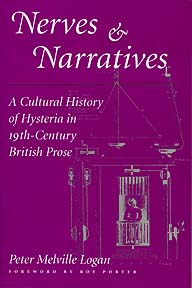 | Title: Nerves and narratives: a cultural history of hysteria in nineteenth-century British prose Author: Logan, Peter Melville 1951- Published: University of California Press, 1997 Subjects: Literature | History | History and Philosophy of Science | Literary Theory and Criticism | Victorian History | English Literature | Women's Studies Publisher's Description: The British middle class of the early nineteenth century was defined by its nervous complaints - hysteria, hypochondria, vapours, melancholia, and other maladies. Peter Melville Logan explores the link between medical theories of nervous physiology and narrative issues central to the literary writing of the period. He examines the assumption, implicit in medical thinking at the time, that the nervous body - unlike its non-nervous counterpart - has a narrative inscribed on its nerve fibers. It becomes "the body with a story to tell."Logan takes up several literary works whose nervous narrators connect their present disorder with an unnatural, unhealthy social order. Concentrating on novels by Godwin, Hays, and Edgeworth, and on De Quincey's Confessions of an English Opium-Eater , Logan weaves cultural phenomena such as crowd psychology and attitudes toward opium addiction into the basic paradigm of the nervous narrative. He explains why these social critiques always tended to promote the same distempered civilization that brought them into being. He then looks at the emergence of the working-class body in the 1840s, changing medical theories, and George Eliot's treatment of medicine in Middlemarch .Logan's book is especially valuable for its rethinking of disciplinary categories that separate medicine from literature and for bringing to light lesser-known literary texts. With a foreword by Roy Porter, it will be a welcome addition to literary, gender, and cultural studies. [brief] Similar Items |
| 15. | 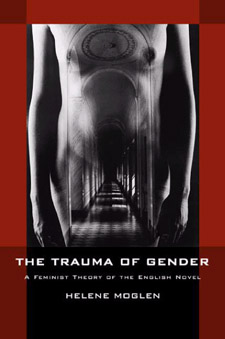 | Title: The trauma of gender: a feminist theory of the English novel Author: Moglen, Helene 1936- Published: University of California Press, 2001 Subjects: Literature | Gender Studies | Women's Studies | European Studies | European History | Literary Theory and Criticism | English Literature Publisher's Description: Helene Moglen offers a revisionary feminist argument about the origins, cultural function, and formal structure of the English novel. While most critics and historians have associated the novel's emergence and development with the burgeoning of capitalism and the rise of the middle classes, Moglen contends that the novel princi- pally came into being in order to manage the social and psychological strains of the modern sex-gender system. Rejecting the familiar claim that realism represents the novel's dominant tradition, she shows that, from its inception in the eighteenth century, the English novel has contained both realistic and fantastic narratives, which compete for primacy within individual texts. [brief] Similar Items |
| 16. | 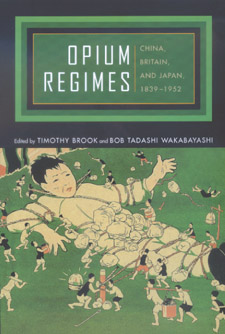 | Title: Opium regimes: China, Britain, and Japan, 1839-1952 Author: Brook, Timothy 1951- Published: University of California Press, 2000 Subjects: History | China | Asian History Publisher's Description: Opium is more than just a drug extracted from poppies. Over the past two centuries it has been a palliative medicine, an addictive substance, a powerful mechanism for concentrating and transferring wealth and power between nations, and the anchor for a now vanished sociocultural world in and around China. Opium Regimes integrates the pioneering research of sixteen scholars to show that the opium trade was not purely a British operation but involved Chinese merchants, Chinese state agents, and Japanese imperialists as well. The book presents a coherent historical arc that moves from British imperialism in the nineteenth century, to Chinese capital formation and state making at the turn of the century, to Japanese imperialism through the 1930s and 1940s, and finally to the apparent resolution of China's opium problem in the early 1950s. Together these essays show that the complex interweaving of commodity trading, addiction, and state intervention in opium's history refigured the historical face of East Asia more profoundly than any other commodity. [brief] Similar Items |
| 17. | 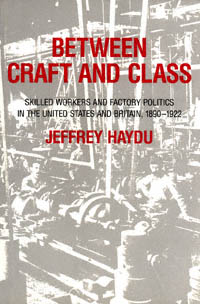 | Title: Between craft and class: skilled workers and factory politics in the United States and Britain, 1890-1922 Author: Haydu, Jeffrey Published: University of California Press, 1991 Subjects: Sociology | United States History | European History | Labor Studies | Technology and Society Publisher's Description: Between Craft and Class provides an incisive new look at workers' responses to the momentous economic changes surrounding them in the early years of the twentieth century. In this work, Haydu focuses on the reaction of skilled metal workers to new production methods that threatened time-honored craft traditions. He finds that the workers' responses to industrial change varied - some defended the status quo, while others agreed to trade customary rules for economic rewards. Under some conditions class protest arose, as workers of diverse skills and trades joined to demand a greater voice in the management of industry. Between Craft and Class explores how broadly based movements for workers' control developed during this critical period, and why they ultimately failed.Comparing workers in the United States and Britain, Haydu's scholarship is distinguished by extensive primary source research and provocative theoretical insights. In its scope and depth, this book will revise current notions of craft politics and working-class radicalism during this period. [brief] Similar Items |
| 18. |  | Title: Descartes's imagination: proportion, images, and the activity of thinking Author: Sepper, Dennis L Published: University of California Press, 1996 Subjects: Philosophy | History and Philosophy of Science Publisher's Description: Renè Descartes is commonly portrayed as a strict rationalist, a philosopher who theorized a radical, unresolvable split between mind and body. In this long-overdue examination of the role of imagination in Descartes's thought, Dennis Sepper reveals a Descartes quite different from the usual dualistic portrayals and offers a critical reconception of the genesis and nature of the philosopher's thought.In a vigorous analysis of the less-known early works, Sepper finds that initially Descartes assigned the imagination a central role in the mind's activity. Although Descartes eventually lost confidence in the philosophy of imagination, an early understanding of its central role in cognition came to shape the most fundamental notions of his mature philosophy. Sepper's radical reassessment of Descartes ultimately raises new questions about the development of modern philosophy. [brief] Similar Items |
| 19. | 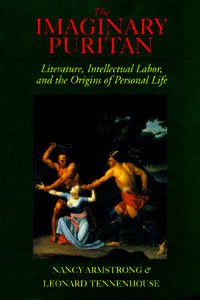 | Title: The imaginary puritan: literature, intellectual labor, and the origins of personal life Author: Armstrong, Nancy Published: University of California Press, 1992 Subjects: Literature | Literary Theory and Criticism | American Literature Publisher's Description: Nancy Armstrong and Leonard Tennenhouse challenge traditional accounts of the origins of modern Anglo-American culture by focusing on the emergence of print culture in England and the North American colonies. They postulate a modern middle class that consisted of authors and intellectuals who literally wrote a new culture into being.Milton's Paradise Lost marks the emergence of this new literacy. The authors show how Milton helped transform English culture into one of self-enclosed families made up of self-enclosed individuals. However, the authors point out that the popularity of Paradise Lost was matched by that of the Indian captivity narratives that flowed into England from the American colonies. Mary Rowlandson's account of her forcible separation from the culture of her origins stresses the ordinary person's ability to regain those lost origins, provided she remains truly English. In a colonial version of the Miltonic paradigm, Rowlandson sought to return to a family of individuals much like the one in Milton's depiction of the fallen world.Thus the origin both of modern English culture and of the English novel are located in North America. American captivity narratives formulated the ideal of personal life that would be reproduced in the communities depicted by Defoe, Richardson, and later domestic fiction. [brief] Similar Items |
| 20. | 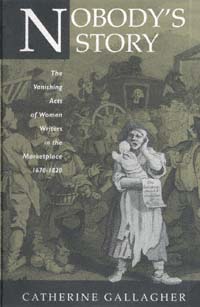 | Title: Nobody's story: the vanishing acts of women writers in the marketplace, 1670-1820 Author: Gallagher, Catherine Published: University of California Press, 1994 Subjects: Literature | English Literature | Literary Theory and Criticism | Women's Studies | European History Publisher's Description: Exploring the careers of five influential women writers of the Restoration and eighteenth century, Catherine Gallagher reveals the connections between the increasing prestige of female authorship, the economy of credit and debt, and the rise of the novel. The "nobodies" of her title are not ignored, silenced, or anonymous women. Instead, they are literal nobodies: the abstractions of authorial personae, printed books, intellectual property rights, literary reputations, debts and obligations, and fictional characters. These are the exchangeable tokens of modern authorship that lent new cultural power to the increasing number of women writers through the eighteenth century. Women writers, Gallagher discovers, invented and popularized numerous ingenious similarities between their gender and their occupation. The terms "woman," "author," "marketplace," and "fiction" come to define each other reciprocally.Gallagher analyzes the provocative plays of Aphra Behn, the scandalous court chronicles of Delarivier Manley, the properly fictional nobodies of Charlotte Lennox and Frances Burney, and finally Maria Edgeworth's attempts in the late eighteenth century to reform the unruly genre of the novel. [brief] Similar Items |